An Aristotelian tradition
In the Nicomachean Ethics Aristotle grappled with the fundamental questions of human existence. There he argues that happiness is the reward of virtue; that the good life, the fulfilled life, is made possible by developing positive traits or strengths of character called virtues; and that discernment in these matters is easier to the extent that a person is virtuous.
These insights of the great pagan philosopher strengthened Newman’s understanding of the human person and orientated him in his educational endeavours.
By Aristotle’s criteria, Newman is eminently suited to advising on the conditions for human flourishing, particularly in its university setting, since he lived the virtues (both human and Christian) to an eminent degree.
Though students are exposed as never before to the self-destructive temptations of popular culture, only lip service is paid to the quaint idea of ‘pastoral wellbeing’. This is largely a consequence of a postmodern society where there are no longer shared values and a consensus of what it means to be a well-formed person.1
University education ‘makes men’
Newman argued ‘that there is an education necessary and desirable over and above that which may be called professional. Professions differ, and what is an education for one youth is not the education for another; but there is one kind of education which all should have in common, and which is distinct from the education which is given to fit each for his profession. It is the education which made the man; it does not make physicians, surgeons, or engineers, or soldiers, or bankers, or merchants, but it makes men. It is that education which enables the man to adorn the place, instead of the place adorning the man. And this is the education for which you especially come to the University – it is to be made men.’ (Address to the students on the opening of the University, November 1854)
Newman tried to explain ‘what it is to be a man, as distinct from having a profession’: ‘Just as a strong man will make a better soldier than a weak one, so a man thus strong in intellect, thus cultivated and formed, will be able to do a great deal for God and the Church, for his creator, his Lord and Saviour, and for his Christian brethren, which another man could not do.’ (Address to the students on the opening of the University, November 1854)
On the other hand, someone who had grown up ‘without learning to be a real man’ would be a boy all through his life. ‘They have no opinion, no view, no resource; they are not fond of reading or thinking, they cannot amuse themselves; their only amusement is going out of doors for it’. Since they have no opinion, no-one would think of asking them for it; when they are with friends they have nothing to converse about, and their conversation is likely to be empty. ‘Hence they get tired of themselves and of each other, and go out for amusements, and then, perhaps, get into bad amusements, because they have no resources.’ (Address to the students on the opening of the University, November 1854)
‘Gentlemen, if I am called upon to state the difference between a boy and a real man, I should say this – that a boy lives on what is without and around him; the one depends upon others for instruction and amusement, the other is able in great measure to depend upon himself. You come here to learn to pass from the state of boys to the state of men.’ (Address to the students on the opening of the University, November 1854)
A well-trained mind will act with decorum; it will not be thrown off balance by any of the changes of life, but will make the best of all circumstances and conduct itself exactly as it should.
Neglect at Newman’s Oxford
Newman was scathing about the Oxford of his undergraduate days:
‘things went on for the most part by mere routine, and form took the place of earnestness. I have experienced a state of things, in which teachers were cut off from the taught as by an insurmountable barrier; when neither party entered into the thoughts of the other; when each lived by and in itself; when the tutor was supposed to fulfil his duty, if he trotted on like a squirrel in his cage, 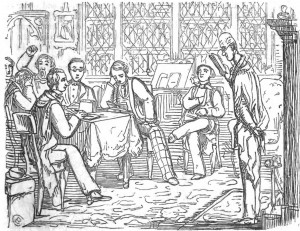 if at a certain hour he was in a certain room, or in hall, or in chapel, as it might be; and the pupil did his duty too, if he was careful to meet his tutor in that same room, or hall, or chapel, at the same certain hour; and when neither the one nor the other dreamed of seeing each other out of lecture, out of chapel, out of academical gown. I have known places where a stiff manner, a pompous voice, coldness and condescension, were the teacher’s attributes, and where he neither knew, nor wished to know, and avowed he did not wish to know, the private irregularities of the youths committed to his charge.’ (Rise and progress of universities)
if at a certain hour he was in a certain room, or in hall, or in chapel, as it might be; and the pupil did his duty too, if he was careful to meet his tutor in that same room, or hall, or chapel, at the same certain hour; and when neither the one nor the other dreamed of seeing each other out of lecture, out of chapel, out of academical gown. I have known places where a stiff manner, a pompous voice, coldness and condescension, were the teacher’s attributes, and where he neither knew, nor wished to know, and avowed he did not wish to know, the private irregularities of the youths committed to his charge.’ (Rise and progress of universities)
While a Fellow and Tutor at Oriel College, Newman adopted a very different approach. He read with his pupils, walked with them, breakfasted and dined with them. He ‘cultivated relations, not only of intimacy, but of friendship, and almost of equality, putting off, as much as might be, the martinet manner then in fashion with College Tutors, and seeking them in outdoor exercise, on evenings, and in Vacation’, Newman says of himself in an autobiographical memoir.
According to his tutee Thomas Mozley, who likened him to ‘a father, or an elder and affectionate brother’, within two years of becoming a tutor, Newman acquired ‘such a devoted body of pupils as Oxford had never seen’, at least since the Middle Ages (Reminiscences: chiefly of Oriel College and the Oxford Movement).
Marking a student’s piece of work at Oriel, Newman wrote: ‘This University intends, (as far as the time of a student’s residence allows) to form his character, religious, moral, & social – i.e. to make him a Christian & a gentleman. Towards making him both, it is a great step to make him a scholar & a man of literary taste – or rather, while making him such, right feelings & principles may be instilled into him.’ (Memorandum book about college pupils, 1826–31)
The ‘problem’ of freedom
At Oxford, Newman witnessed at first hand the consequences of that intoxicating mix of freedom and virtually no responsibility, and realised that formative living depended on the previous acquisition of good habits and on wise oversight by the authorities.
Throughout his life Newman was preoccupied with the ‘problem’ of human freedom, and in particular how it played out in a person’s formative years. In all his educational ventures he grappled with how best to negotiate that delicate and gradual process of launching the young person into the world, how to pitch demands and expectations with just that right mixture of freedom and restraint. He was acutely aware of the need to avoid excessive regulation and oversight on the one hand, and neglect on the other.
In Newman’s age as in our own, well-meaning but counterproductive over-protectiveness at the various stages of education was as common as gross neglect; and then, as now, this was particularly evident at that crucial moment of transition from school to university.
An education in freedom
Newman knew that responsible people down the ages have taken care to provide suitable living conditions and paternal oversight for the student living away from home. He was also aware of the need for a different kind of discipline over the student than that exercised by school teachers. He had come to realise the need for a gradation of liberties as the young person approached adulthood – what might be termed a progressive ‘education in freedom’ – and for the right mixture of liberty and restraint.
Training for life
When discussing the development of the student as a human person, Newman describes the ideal to be sought. ‘A habit of mind is formed which lasts through life, of which the attributes are freedom, equitableness, calmness, moderation and wisdom’.
John Hungerford Pollen, the Professor of Architecture in Dublin and formerly a senior proctor at Oxford, paid tribute to the way Newman aimed to foster moral training in Dublin.
‘Newman was very decided as to the status of University students. The duty of the Institution in this regard, was to take them when the age of boyhood was over, to discipline and train their faculties; to educate, and not merely to instruct; to prepare them for warfare with the world; to make men of them.’ (Pollen to Goldie, August 1890)
Pollen thought this principle was poorly understood in Ireland, whereas for Newman students between 18 and 21 were no longer boys;
‘neither was the Institution with its colleges a seminary. It was a gymnasium for the formation of character, and the training of the intellect. It had to exercise its youth in the right use of moral restraint; to prepare them for that full liberty which awaited them when University life was ended. They had to learn the right use of liberty as well as the right use of the reasoning powers, and to appreciate the confidence placed in their honour. The fact that such liberty is sometimes abused in the old Universities did not frighten Father Newman. The great value he attached to the kind of discipline he proposed more than outweighed any danger of abuse. And against such danger a Catholic University had safeguards which were lacking in the older institution.’ (Pollen to Goldie, August 1890)
Newman witnessed the beginning of that unrestrained quest for professional training and mere technical knowledge, urged by the liberals and utilitarians of his day, and saw an antidote in both a genuinely liberal education and a collegiate education; if a university neglects the residential side then it neglects what it is most dangerous to neglect. Newman inherited the idea that the moral development of the whole person was an essential part of the liberal education associated with Oxford and Cambridge; this education was supposed to form and shape character and inculcate a sense of high responsibility to society. Insofar as it is a place merely for the dissemination of knowledge, a university invariably has a limited effect on the student: the college, aided in its task by the Church, can transform an individual. As Newman commented, ‘The world is content with setting right the surface of things; the Church aims at regenerating the very depths of the heart’. (Idea of a university)
A flourishing university
Newman’s emphasis on academic matters did not come at the expense of the broader aim of educating for human excellence, because he sought to inform the University by moulding its ethical atmosphere, its attitude to the world, and its approach to social education.
In applying the concept of integrity not just to the person, as Aristotle had done, but to the university, Newman asked himself, How can a university have a rich and full life? What needs to be put in place to foster both corporate and individual well-being? For Newman this was not just about intellectual flourishing, but also a moral question. He was concerned about how the student should live and how the university should be structured to make such living possible so as to provide an integral formation. He followed Aristotle in holding that ‘it is impossible, or at least not easy, to perform praiseworthy actions without external means’, and that training was necessary to develop moral and intellectual virtues (Rise and progress of universities). Hence genuine human flourishing at university required the assistance of the moral and religious discipline of the collegiate house (or its equivalent) and the personal influence of tutors (or their equivalent).
Newman knew that intellectual and moral virtues were best developed in a community which embodied such an educational ideal, as attendance at such places and the influence of its teachers would furnish the students with correct principles of thought and action.
Genius loci
Newman considered it of great importance to create among the students a healthy intellectual atmosphere, which once begun would be carried on by tradition.
‘It is scarcely too much to say that one-half of the education which young people receive is derived from the tradition of the place of education. The genius loci, if I may so speak, is the instructor most readily admitted and most affectionately remembered.’ (Report for the Year 1854–55)
The authorities were unable to create it directly, but they were in a position to foster and influence it.
Newman felt that everything in a long-established institution was influenced by this intangible but all-important power, which he called the genius loci. It has been described as combining ‘in itself the power of discipline with the power of influence, for though its ways were secret and indirect and personal, it had all the authority of law and all the consistency of a living idea’. (The imperial intellect, D. A. Culler)
Newman’s audience would have been familiar with the concept from the Dublin lecture in which he describes how a youthful community naturally gives birth to a living teaching, which in course of time
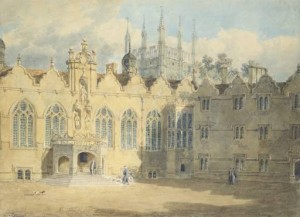
takes the shape of a self-perpetuating tradition ‘which haunts the home where it has been born, and which imbues and forms, more or less, and one by one, every individual who is successively brought under its shadow’. It constituted ‘a sort of self-education’, and was clearly visible in the academic institutions of Protestant England.
‘A characteristic tone of thought, a recognized standard of judgment is found in them, which, as developed in the individual who is submitted to it, becomes a twofold source of strength to him, both from the distinct stamp it impresses on his mind, and from the bond of union which it creates between him and others.’ (Idea of a university)
Leaving aside the question of whether the standards and principles of any one particular ethical atmosphere were true or false, there was no disputing that here was a real teaching. Since the Catholic University was starting without the aid of this tradition, Newman deliberated about how to substitute for this ‘invisible teacher’, as well as how to grow it from seed.
Scholarships and the genius loci
One means of fostering the genius loci was by the establishment of generous scholarships. Newman maintained (perhaps somewhat optimistically) that often,
‘the most studious are the best principled and most religiously minded of the young men; at least a certain share of self-command, good sense, and correctness in deportment they must have; and, by bringing them forward in the way I am proposing, the respect due to successful talent comes in aid of order and virtue, and they become the centre of influence, who are likely to use influence well.’ (Report for the Year 1854–55)
‘Scholars are resident members of a lodging-house, who exercise certain collegiate functions and have certain small privileges, such as privileged access to the dean’s and tutors’ rooms, and their special confidence; and thus, without having a shadow of jurisdiction over the rest, they would constitute a middle party between the superiors and the students, break the force of their collisions, and act as an indirect and spontaneous channel of communicating to the students many an important lesson and truth, which they would not receive, if administered to them from the mouth of a superior.’ (Report for the Year 1854–55)
There is more than an echo here of the prefect system introduced by Thomas Arnold at Rugby School which played a key part in reforming the public-school system. During the middle decades of the nineteenth century it gradually became accepted that character training was enhanced by a delegation of authority to the boys themselves and that, besides instilling virtues, self-government had two practical advantages: it made the headmaster’s job easier, and it prevented rebellion by uniting some of the most influential boys with the masters. Though theologically at odds with Arnold’s latitudinarianism, Newman clearly admired his use of surrogate authority and employed it himself.
Extracurricular activities and social life
Whether student interests expressed themselves in more organised or purposeful ways, as in drama, music or sport, or whether they surfaced in more informal settings, such as at mealtimes and social gatherings, Newman contended that education in the sense of personal development was continually taking place. Though it is hard to pin down the precise nature of this activity and assess its formative value, this ‘unofficial’ side to university education had, for Newman, an incalculable worth.
Between the formal daily round of lectures and tutorials and informal moments of relaxation and amusement, student enthusiasms – Newman thought – should find outlets in semi-formal settings.
Newman the schoolboy
While a schoolboy at Ealing School, Newman participated enthusiastically in school life, acting in Latin plays, winning prizes for speeches, taking part in debates, learning to play the violin, writing musical compositions, leading a boys’ society, and editing six different school magazines. He also enjoyed reading the eighteenth-century essayists and poets, and attempted to imitate their style in poems, satires and historical romances; and he devoured the novels of Walter Scott. By contrast, he had no interest in outdoor or sporting activities other than walking and riding.
Newman the Oxford student
While an undergraduate at Trinity College, Oxford, Newman led a remarkably rich student life. He took up the works of Gibbon and Locke, entered himself for university prizes, attended concerts, studied manuals and tried experiments in chemistry, and attended lectures in the newly-emerging science of geology. At a time when student activities were migrating from locations in town into the colleges, which were becoming the natural home for sport, dining and drinking, debating, politics and literature, Newman played first violin in a music club at St John’s College and co-founded the Trinity College Book Society for the dissemination of modern novels (such as Ivanhoe). With his friend John Bowden, he composed a verse romance called Bartholomew’s Eve, which they had printed (250 copies in two instalments), and started a periodical. Appearing just two years after the first truly undergraduate magazine, The Undergraduate ran to six numbers and enjoyed a brief popularity, until the cover of anonymity was blown in March 1819 and the editors abandoned the enterprise.
Newman wrote an article in 1819 for The Undergraduate, in which he proposed the establishment of a debating society for Oxford undergraduates which should meet fortnightly to debate matters covering ‘the whole range of history, poetry and the fine arts, indeed nothing should be excluded but the politics of the last 100 years’. This was written before the Oxford Union was founded (1830) and its forerunner, the United Debating Society (1823–25). Gathering its members from all the colleges and halls of Oxford, Newman proposed that ‘it would be a school for the future senator or lawyer, it would enlarge and refine the mind, it would be a most agreeable relaxation after the toils of the day’.
Newman the university rector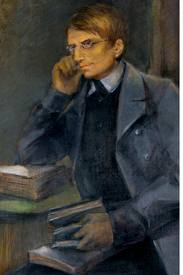
As founding rector of the Catholic University in Dublin, Newman’s pet project was the Historical, Literary and Aesthetical Society, a student-run society which was an outlet for debating, journalism and the reading of papers.
Just before the ‘cult of games’ took off at the public schools and universities, Newman ensured that his university acquired a cricket pitch, as well as a billiards table, and was delighted that the collegiate houses each had their own cricket and rowing teams.
The L&H
The Literary and History Society was entirely Newman’s creation, and he was busy drafting a set of rules for what he termed a ‘debating society’ a few months before the University began. The idea of a debating society along the lines of the Historical, Literary, and Aesthetical Society (as it was originally called) can be seen from an article he wrote in 1819 for The Undergraduate, the student newspaper he and John Bowden founded and edited at Oxford. The significance of the article – and indeed of The Undergraduate itself – is that it reflects a general dissatisfaction with the Oxford that existed in Newman’s time; more importantly, it testifies to Newman’s long-held conviction that a great part of the process of education – if it is to be a real education – should lie outside the official academic routine.
The name of the Historical, Literary, and Aesthetical Society reflected the content of the society’s early meetings and the contemporary taste for literary composition and criticism. In line with Newman’s wish to keep politics at bay, he insisted (as in his 1819 article) on the rule that ‘No member may introduce the subject of British politics of the last fifty years’.
The first meeting of the Historical, Literary, and Aesthetical Society took place on 9 March 1856 in the basement of University House and was presided over by Newman. Newman retired from view for the second session of 1856/57, when the society’s president was Henry Bethell, a nephew of the attorney-general Sir Richard Bethell.
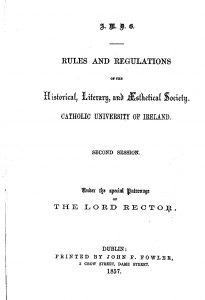 In 1856/57 the society had twenty-three members, besides the six officers (and honorary members) – which totalled to around half the number of undergraduates. Literary meetings and debates took place on alternate weeks, and proceedings were governed by a highly-elaborate rule-book. All members were required to take their turn in chairing meetings. The Rules and Regulations (1857) stated that ‘Nothing more is required from any member than a courageous determination to think for himself; to express his ideas as well as he is able; and to listen with interest to the opinions and thoughts of others, submitted to his criticism.’
In 1856/57 the society had twenty-three members, besides the six officers (and honorary members) – which totalled to around half the number of undergraduates. Literary meetings and debates took place on alternate weeks, and proceedings were governed by a highly-elaborate rule-book. All members were required to take their turn in chairing meetings. The Rules and Regulations (1857) stated that ‘Nothing more is required from any member than a courageous determination to think for himself; to express his ideas as well as he is able; and to listen with interest to the opinions and thoughts of others, submitted to his criticism.’
There is no doubt that Newman saw the Historical, Literary, and Aesthetical Society as a great instrument for rounding out the education imparted at the Catholic University and for preparing students for the world of work. This was the practical working out of a passage from his Dublin lectures, where he had countered the claims of the educational utilitarians of his day and dwelt on the practical benefits of a liberal education:
‘the man who has learned to think and to reason and to compare and to discriminate and to analyze, who has refined his taste, and formed his judgement, and sharpened his mental vision, will not at once be a lawyer, […] a man of business, or a soldier, or an engineer but he will be placed in that state of intellect in which he can take up any of these sciences or callings […] with an ease, a grace, a versatility, and a success, to which another is a stranger.’ (Idea of a university)
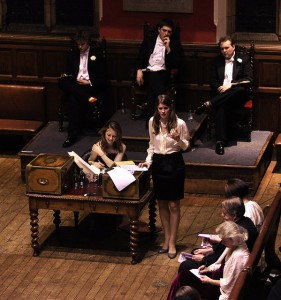 After Newman’s departure the society became known as the Literary and Historical Society, and the title of president was renamed as auditor. Today the society is known more familiarly as the ‘L&H’.
After Newman’s departure the society became known as the Literary and Historical Society, and the title of president was renamed as auditor. Today the society is known more familiarly as the ‘L&H’.
Several of its early auditors went on to distinguish themselves in public life, just as Newman had hoped: Hugh McDermot (auditor in 1858/59) became solicitor-general, attorney- general, then a privy councillor for Ireland; Charles Dawson (auditor in 1867/68) became mayor of Dublin and MP for Carlow; (Sir) George Fottrell (auditor in 1870/71) a political commentator; John Dillon (auditor in 1874/75) the leading nationalist parliamentarian.
Newman the school founder
In the school he founded in 1859 with the assistance of parents who were friends of his, Newman ensured it had a remarked rich extra-curricular life. He himself oversaw many productions of an annual Latin play and he played second violin in the one of school’s music groups.
Mutual education
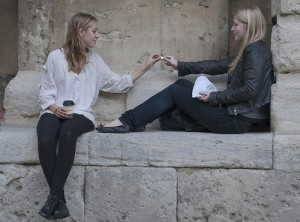 It is because the Dublin lectures are about the essence of a university, not about its fully functioning existence, that they contain a great deal about the intellectual formation of the individual at university, but relatively little about character formation itself and the benefits of residential student life. The main exception occurs in the seventh lecture, where Newman extols the advantages of a residential university by dwelling on the mutual education that takes place there.
It is because the Dublin lectures are about the essence of a university, not about its fully functioning existence, that they contain a great deal about the intellectual formation of the individual at university, but relatively little about character formation itself and the benefits of residential student life. The main exception occurs in the seventh lecture, where Newman extols the advantages of a residential university by dwelling on the mutual education that takes place there.
‘When a multitude of young men, keen, open-hearted, sympathetic, and observant, as young men are, come together and freely mix with each other, they are sure to learn one from another, even if there be no one to teach them; the conversation of all is a series of lectures to each, and they gain for themselves new ideas and views, fresh matter of thought, and distinct principles for judging and acting, day by day.’ (Idea of a university)
This goes some way to explaining his preference for a residential university without formal teaching (other than tutorials) over a non-residential university with lectures and exams: the former provided the setting for a deeper formation. Part of this unofficial educative experience comes about from the very mix of students, for life at university ‘is seeing the world on a small field with little trouble; for the pupils or students come from very different places, and with widely different notions, and there is much to generalise, much to adjust, much to eliminate’ (Idea of a university).
Newman put great store on the place of learning (especially – and ideally – if the university was residential), and on that invisible teacher he called the genius loci, since he felt that the right kind of personal character could only be shaped under the right conditions.
Newman saw clearly what so many fail to see: that the student body in a university shapes intellectual and moral character for better or worse; that the formative interaction between students is often more telling than the mere absorption of information from lecturers; that half the education that really matters in a university is imparted by the students to each other. Studying at university while living at home does not rise to what Newman calls ‘the ancient idea of the university’ – to say nothing of the various ways of remote learning which largely eliminate the need for person contact.
‘Mutual education, in a large sense of the word,’ says Newman, ‘is one of the great and incessant occupations of human society, carried on partly with set purpose, and partly not. One generation forms another; and the existing generation is ever acting and reacting upon itself in the persons of its individual members’. (Rise and progress of universities) This can only take place in a rich, though unsystematic, way in the privileged setting of a university.
Acquiring the social virtues
In the first of his ‘university sketches’ Newman identifies some of the social virtues which contribute to forming the gentleman: ‘the carriage, gait, address, gestures, voice; the ease, the self-possession, the courtesy, the power of conversing, the talent of not offending; the lofty principle, the delicacy of thought, the happiness of expression, the taste and propriety, the generosity and forbearance, the candour and consideration, the openness of hand’.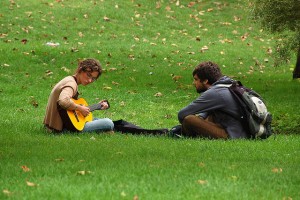
Some were natural endowments, some were found at all levels of society, some were a direct precept of Christianity; but certainly ‘the full assemblage of them, bound up in the unity of an individual character’, could not be learned from books. They were to be acquired where they were found: in highly civilized society.
It was only reasonable that ‘you cannot learn to converse till you have the world to converse with; you cannot unlearn your natural bashfulness, or awkwardness, or stiffness, or other besetting deformity, till you serve your time in some school of manners’ (Rise and progress of universities).
Adventures of Mr Verdant Green
The Adventures of Mr Verdant Green, an Oxford freshman first appeared in serialized form in the Illustrated London News in 1851, then in book-form in 1852. The author, Edward Bradley, wrote under the pseudonym of Cuthbert Bede.
No other book of its genre – the Adventures sold 100,000 copies in twenty years – was as powerful in fixing in the public mind the Oxbridge ideal of English education. The Adventures ignored the 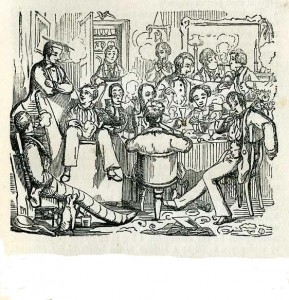 excesses of student life, the staple fare of so many accounts of university stories, and instead portrayed an Oxford where the official intellectual and moral influences were minimal, but where the genius loci and student interaction were the main forces for good.
excesses of student life, the staple fare of so many accounts of university stories, and instead portrayed an Oxford where the official intellectual and moral influences were minimal, but where the genius loci and student interaction were the main forces for good.
Early in the story a clergyman advises his friend: ‘It is formation of character that I regard as one of the greatest of the many great ends of a university system; and if for this reason alone, I should advise you to send your future country squire to college.’ Having explained how the informal side of Oxford works, the clergyman stresses that while the advantages of social education ‘come in secondary ways, and possess the mind almost imperceptibly, yet they are of primary importance in the formation of character, and may mould it into the more perfect man’.
Gaining a view of life
Newman’s insights into the importance of university for a student to gain a view of life are brilliantly conveyed in his first novel Loss and gain: the story of a convert (1848). Running through this partly autobiographical tale is the theme of how this comes about – or fails to do so – in a university setting, when young people are establishing their view of life by putting together the pieces of the jigsaw of experience.
While he cautioned others about the dangers of forming views too quickly, nevertheless Newman urged students and others to strive at forming a view, where possible, and not to take the easy and lazy way out.
The historian J. A. Froude describes what it was like as a student conversing with Newman:
Newman’s mind was world-wide. He was interested in everything which was going on in science, in politics, in literature. Nothing was too large for him, nothing too trivial, if it threw light upon the central question, what really man was, and what was his destiny. […] He seemed always to be better informed on common topics of conversation than anyone else who was present. He was never condescending with us, never didactic or authoritative; but what he said carried conviction along with it. When we were wrong he knew why we were wrong, and excused our mistakes to ourselves while he set us right. Perhaps his supreme merit as a talker was that he never tried to be witty or to say striking things. […] He was lightness itself – the lightness of elastic strength – and he was interesting because [….] he had something real to say. (Short studies on great subjects (1883)
Loss and gain
Loss and gain: the story of a convert (1848) is a novel based on Newman’s undergraduate days at Oxford. It was among the first of the genre of university novels – and the first to directly link the protagonist’s personal growth to a university experience. It was also the first coming-of-age novel or Bildungsroman to make the university the central or primary character.
Newman’s Oxford is a self-contained learning environment inhabited by earnest young men who are forming their life views, casting them into words, putting them on an intellectual basis, and testing them out on others. In describing how students mature both morally and intellectually, Newman draws the distinction between those who come to form a coherent ‘view’ and those who come to acquire an insubstantial ‘viewiness’, which perhaps remains with them all their lives.
‘When, then, men for the first time look upon the world of politics or religion, all that they find there meets their mind’s eye as a landscape addresses itself for the first time to a person who has just gained his bodily sight. One thing is as far off as another; there is no perspective. The connection of fact with fact, truth with truth, the bearing of fact upon truth, and truth upon fact, what leads to what, what are points primary and what secondary—all this they have yet to learn. It is all a new science to them, and they do not even know their ignorance of it.’
Some students develop a comprehensive perspective of the landscape of life by painstakingly piecing together fragments of vision, experience and action, and thereby construe a coherent picture of the world which gives them the possibility of living a coherent life. Others ‘have no consistency in their arguments’; they argue one way today, and another the next. ‘Their lines of argument diverge; nothing comes to a point; there is no one centre in which their minds sits, on which their judgment of men and things proceeds.’
Though Newman’s hero is less well-read and knowledgeable than a college friend, the friend turns out to be too quick to form a view, impatient to reduce things to a system and over-fond of argument, and ends up as glib and superficial; it is instead the protagonist who acquires a consistent and true view of things by means of patient questioning, the careful sifting of facts and discernment of principles, a refusal to take intellectual short-cuts or to make do with simplistic explanations.
Implicit in the story is that what makes this process possible is the residential nature of a university which provides for such formative opportunities outside the lecture hall; by means of the collegiate structure (of Oxford) and the human scale of domestic arrangements, the right conditions are provided for the flourishing of the individual student through the companionship and friendship nurtured there.